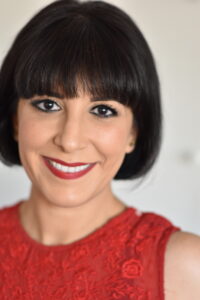
By John Malkin
Dr. Viviana Beatriz MacManus is the author of “Disruptive Archives: Feminist Memories of Resistance in Latin America’s Dirty Wars.” The book was released in 2020 by University of Illinois Press and discusses the history of gender and state violence during the “Dirty Wars” of Argentina and Mexico (1960-1980s) and the current struggles over the historical memory of this era. Dr. MacManus is assistant Professor of Spanish and French Studies at Occidental College in Los Angeles.
DIRTY WARS AND COLD WARS
JM: “Would you start with explaining what the Dirty Wars were.”
Viviana Beatriz MacManus: “Dirty Wars; this term was used all over Latin America during the Cold War era to talk about counterinsurgency campaigns against Leftist, Socialist and Communist movements, nonviolent as well as guerrilla or armed insurgencies. Activists use the term dirty war to allude to the gross inequities and imbalance of power between state violence and the leftist activism that was happening at the time. I rely on that term in my book as a way to unearth those illegal tactics the state used to eradicate all kinds of Leftist activism in the Southern hemisphere.”
MEXICO WAS MORE UNDER THE RADAR
JM: “How does Mexico fit into the Dirty Wars?”
Viviana Beatriz MacManus: “One of the things not really mentioned when we talk about Cold War history is Mexico. Many of us are familiar with what happened in Chile or Argentina. People know about the kind of egregious human rights violations that occurred in their dirty wars supporting fascist Right-wing dictatorships and the very public, visible coup d’etat and bombing of the palace in Santiago, which led to the CIA-backed coup and ousting of Salvador Allende (September, 1973) and the imposition of a dictator, Pinochet.
Mexico, on the other hand, was more under the radar. Mexico tried to position itself as a forward-thinking democracy that was different from the Global South dictatorships; “We’re not one of these hyper-violent fascist states that disappear and murder our own citizens.” When they actually did! In that way, it was almost more sinister because Mexico projected an image of national progress with notions of democracy. But it was using the exact same tactics of forced disappearance, torture and murders of guerrilla leaders.
There was an actual hemispheric pattern of state violence and repression that occurred with the help of U.S. military and financial assistance to stop all kinds of Communist and Leftist resistance to these nascent neoliberal economic practices.”
THE PAST IS PRESENT
JM: “Your book is based on interviews you did in Argentina and Mexico in 2012 with twelve women who were involved in unarmed and armed Leftist groups and were imprisoned and tortured. Tell me about meeting these brave women.”
Viviana Beatriz MacManus: “The most amazing part of the book was going to meet the women and hear their stories. It’s really hard to relay in a book the kind of dialogic relationship that establishes with an interview; having them open up their lives to you with very personal, harrowing details.
Many of the women wanted to talk about their experiences because there is that culture of impunity and “el olvido” that normalizes; “Let’s move beyond the past.” But for them, the past is present. And there’s a need for more awareness – especially in the U.S. – of what happened. The women all had such unique experiences. It was really important to maintain the multiplicity of perspectives and different ways of processing trauma.
I gave the example of the two women – Bertha Lilia and Alejandra – who talk about gender dynamics in very different ways. They were friends in the exact same guerilla group in Guadalajara (People’s Revolutionary Armed Forces – FRAP) and one remembers her friend very clearly being discriminated against. And that friend said, “Not at all. I’m not going to talk badly about the guerrilleros who were murdered by the state.” She knows that she does not want to be critical, because the state has created this entire narrative that has criminalized, disappeared and murdered her campaneros. Whereas her friend said, “I don’t have any problem being critical. I understand the state did this. But I also think it’s important to talk about those gender dynamics within our own organizations.””
FURTHER RADICALIZED
JM: “Some of the women were radicalized during the 1960s, including 1968 when there was a massacre of Leftist activists in Mexico City. What did you hear from these women about being radicalized by state violence and then joining armed struggles?”
Viviana Beatriz MacManus: “Due to their experiences of being imprisoned or targeted by the state, most of them were further radicalized. Some of them were not even politically active. Especially in Argentina, there was a lot of widespread repression. You could be a friend of a friend of an activist and they’d say, “You know so-and-so? We’re going to interrogate you.”
Like Nilda Eloy, from Argentina. She was not a political activist. But because one of her ex-partners was, they interrogated her. She was in prison for years. She was not political. They targeted her and she became super radical and politically active to this day. There were other women that, because of the violence, just stopped being activists because it was so traumatic. That was one of the desired goals of the state, right? To terrorize people into inaction. But they didn’t realize that the trauma and terror made some of them even more radical and a lot of them turned to more violent measures. The women said, “If the state is going to be murdering us on this mass scale, we might as well take up arms for self-defense.”
STATE VIOLENCE
JM: “You write that, “We must re-envision how to achieve justice and truth outside of the realm of the state.””
Viviana Beatriz MacManus: “When the state is the arbiter of human rights, but also the entity that committed those violations of human rights, it’s a massive contradiction. A lot of women I interviewed pointed this out. How are they going to trust the entity that five years before had committed those violations of human rights? It doesn’t matter if it’s a new president, it’s still the same institution. And a lot of those men – mostly men – remained in power in Argentina and Mexico. It’s not like this massive shift of roles occurred after the violence ended.
On the other hand, they’re also aware that the international human rights community is where a lot of grievances can be aired. So, they’re using it strategically, right? They want to use the state as an avenue; “If you’re going to interview us for the official Human Rights Report or hold these trials to bring these dictators to justice,” they will absolutely do it.”
THE QUESTION OF VIOLENCE – ANGELA DAVIS
JM: “Governments always establish a monopoly on the legitimate use of violence. They define what is illegal force and what is considered self-defense. They never view their own structural violence as illegal or immoral.”
Viviana Beatriz MacManus: “Have you seen the Black Power Mix Tape?” I really love this one interview with Angela Davis. They asked her about violence and she kind of spun the question back at him; “I knew the four girls that were killed in the bombings (September 15, 1963 Birmingham Church bombing). She says, “No one talks about the racist forms of violence by white supremacy and the state on Black communities. That’s not part of the violence question.”
JM: “It was legal to openly carry loaded firearms in public in California until Black Panthers formed armed self-defense patrols to protect themselves against police violence.”
Viviana Beatriz MacManus: “During the Black Power and Chicano movements, Cointelpro in the U.S. was very active and labeling these Leftist organizations as terrorist groups, similar to what was happening all over Latin America. There’s this transnational hemispheric trend where the state would position these organizations as terrorists, subversives, threats to national security, when in fact it was really about self-defense because of the kind of violence they were experiencing daily. Whether it was the Black Panthers or guerilla groups in El Salvador or Mexico.”
U.S. WHITE FEMINISM
JM: “What’s your view on feminism now? Some people say that women moving up corporate ladders or being allowed to have combat roles in the military is a great victory for feminism. I was hoping feminism would help disrupt and dismantle Capitalism and militarism.”
Viviana Beatriz MacManus: “What you’re describing is a very liberal U.S. white feminism. Neoliberal feminism. Unfortunately, it’s the loudest form of feminism we have. Historically there have been women of color feminism, queer feminism – since the early ‘80s – with Gloria Anzaldúa and Audre Lord and all of these amazing women of color scholars. The Combahee River Collective declaration (1977) is a beautiful statement, a powerful stance on anti-capitalism, anti-racism. It has all the tenets that go into what many of us believe feminism should be; to really dismantle institutions that uphold the intersection of patriarchy, white supremacy, imperialism and Capitalism.”
This story was originally published in the Santa Cruz Sentinel on February 23, 2022 and broadcast the same day on “Transformation Highway” with John Malkin on KZSC 88.1 FM kzsc.org.

